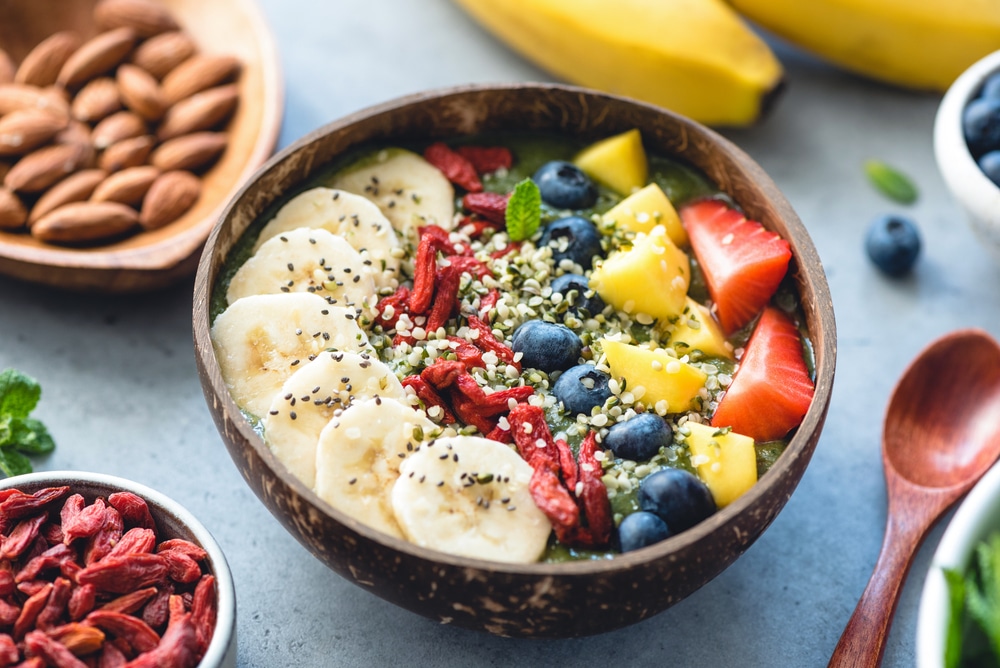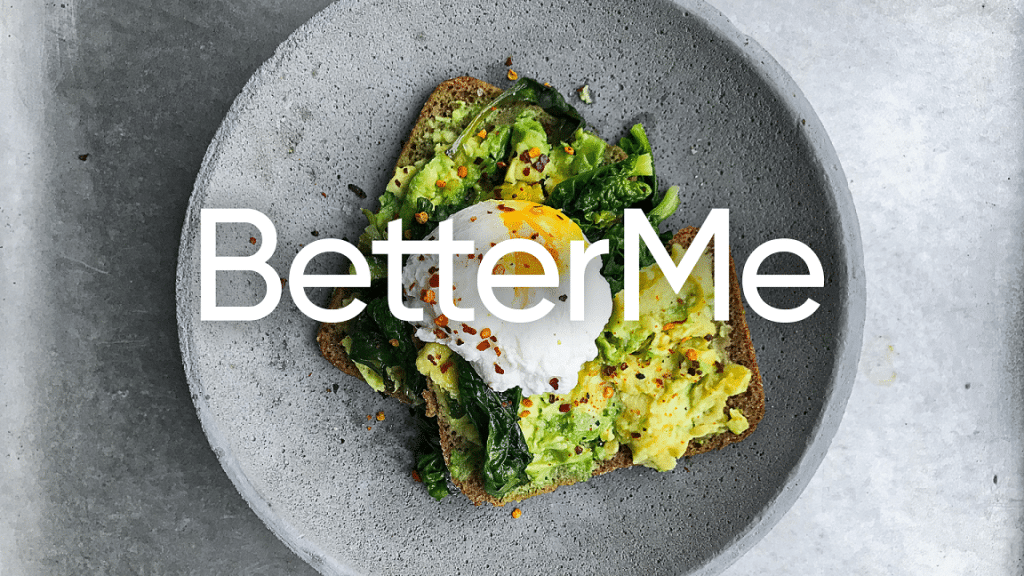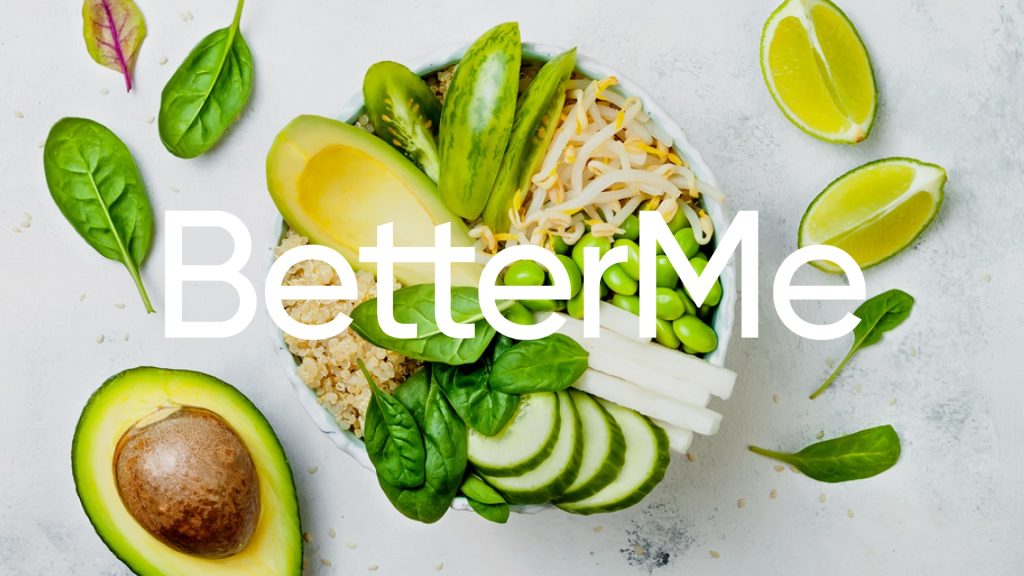Cognitive decline and memory loss are some of the common health issues that come up as we age. While there is no 100% sure-fire way to prevent this completely, there are ways to help support and protect your brain health. One important way is by eating foods that are known as “brain-friendly”. These foods are packed with nutrients that are essential for cognitive function and can help keep your brain healthy and functioning at its best. The nutrients in these foods not only keep your brain healthy but may also improve your ability to perform specific mental tasks such as memory recall, focus, and attention span. In this article, we’ll explore ten of the best brain-friendly foods and how they can help support your cognitive health.
Get your personalized
meal plan!
Which Nutrients Are Essential For Brain Function?
For your brain to function properly, it needs specific nutrients. Here are the most important ones, listed in no particular order:
Omega-3 Fatty Acids
Omega-3 fatty acids are a type of polyunsaturated fat that is essential for cognitive health (14). They are found in high amounts in oily fish, such as salmon, as well as flaxseed and walnuts, and are known to support memory, focus, and attention span.
Vitamin B12
Vitamin B12 is another nutrient that is essential for brain health. This vitamin is found in meat, poultry, and eggs and is important for the production of myelin, a fatty substance that surrounds nerve cells and helps to protect them (16).
Other B Vitamins
The other B vitamins, including thiamin, riboflavin, niacin, and vitamin B6, are also important for cognitive health. These vitamins help to support the function of the brain and nervous system (6).
Getting enough of these may also reduce anxiety and stress, improve mood and help to protect the brain from damage.
Antioxidants
Antioxidants are nutrients which protect cells from damage caused by free radicals. Free radicals are unstable molecules that can damage cells, including brain cells.
Some antioxidants, such as vitamins C and E, are especially important for brain health as they help to protect the brain from damage caused by free radicals (17).
Lycopene is a type of antioxidant that is found in high amounts in tomatoes. This nutrient is also known to protect the brain from damage caused by free radicals (15).
Choline
Choline is a nutrient that is important for cognitive health. It is found in eggs, liver, beef, and some other foods. Choline helps to support the function of the brain and nervous system (8).
It is especially important for pregnant women and young children, as it helps to support healthy brain development.
Read More: Wheat Germ Nutrition Facts: Is This Little Cereal Grain The Next Superfood?
Vitamin K
Vitamin K is a lesser-known nutrient that is important for brain health. This vitamin is found in leafy green vegetables and may help to protect the brain from damage associated with Alzheimer’s disease (28).
It also plays an essential role in blood clotting and helps to keep the blood vessels healthy (31).
Zinc
Zinc is another nutrient that is essential for cognitive health. It is vital for supporting memory, focus, and attention span (32). Zinc is found in high amounts in meat, poultry, eggs, and shellfish.
Iron
Iron is also an important nutrient for brain health. It is essential for the production of red blood cells and helps to carry oxygen to the brain (21). Good sources of iron include meat, poultry, fish and leafy green vegetables.
Which Superfoods Are Good For The Brain?
The foods you eat play a role in keeping your brain healthy. Some of the best foods you can eat to boost brain health include:
Fatty Fish
Fatty fish such as salmon, mackerel, and herring are beneficial for cognitive health in two ways.
Fatty fish is high in omega-3 fatty acids, which are essential for brain health. Omega-3 fatty acids help protect the brain from age-related damage and keep it functioning optimally. They may also play a role in preventing cognitive decline and Alzheimer’s disease (14).
Fatty fish is also a good source of vitamin B12, which is essential for brain health. Vitamin B12 helps keep the brain healthy by protecting against nerve damage and supporting cognitive function (6).
Research suggests that people who eat fish regularly have more gray matter in their brains. Gray matter is associated with better cognitive function and a reduced risk of Alzheimer’s disease (20).
If you want to keep your brain healthy, make sure to include fatty fish in your diet. You can enjoy them grilled, baked, or even smoked. Just make sure to avoid frying them, as this can make them calorie-dense.
If you’re not a fan of fish, you can also get omega-3 fatty acids from fish oil supplements. However, it’s always best to get your nutrients from food whenever possible.
Looking for a way to break the vicious cycle of weight loss and tone up all the jiggly parts? Watch the extra pounds fly off and your muscles firm up with the BetterMe app!
Coffee
Coffee is one of the most popular drinks in the world, and for good reason. Not only does coffee taste great, but it also has some impressive possible health benefits. Coffee is especially good for your brain.
If you need to be alert and focused for a long period, coffee is a great choice. Caffeine helps to keep you awake and alert by blocking adenosine, a chemical that makes you feel sleepy (7).
Caffeine is a stimulant which can improve your mood. Studies have shown that caffeine can counter the effects of sleep deprivation on mood and cognitive performance (10).
Coffee might also help to protect your brain from age-related decline. One review suggested that lifelong coffee/caffeine consumption was associated with a lower risk of developing Alzheimer’s disease. One factor may be that coffee contains antioxidants that help to protect cells from damage and inflammation (11).
As you can see, coffee has several impressive potential health benefits for your brain. So the next time you need a pick-me-up, reach for a cup of coffee instead of a sugary snack. You’ll be glad you did.
Blueberries
Blueberries and other deeply colored berries are rich in flavonoids, a type of antioxidant. In fact, blueberries have one of the highest concentrations of flavonoids of all fruits and vegetables (23).
Flavonoids may be important for maintaining brain health. They have the potential to protect nerve cells from damage and help keep communication between cells functioning properly. Flavonoids may also help improve memory and cognitive function (27).
Blueberries are an excellent source of vitamin C, which is also important for brain health (18). Vitamin C helps keep the brain’s neurotransmitters functioning properly and plays a role in memory formation (30).
If you’re looking for a healthy snack that can also help keep your brain sharp, reach for a handful of blueberries.
Dark Chocolate
There is growing evidence that dark chocolate is good for your brain. This is likely due to the high levels of flavonols, a type of antioxidant, found in dark chocolate.
Cocoa flavonols have been shown to improve cognitive function and protect the brain from damage in animals. They can also improve blood flow to the brain, which may help keep your brain healthy as you age (26).
Dark chocolate is also a good source of magnesium, which is important for brain health (26). Magnesium helps to protect the brain from damage and improve cognitive function (29).
If you have a sweet tooth, dark chocolate is a great way to satisfy it while also providing some health benefits. Just make sure to choose a dark chocolate with a high cocoa content, as it will contain the most flavonols.
Broccoli
Broccoli contains a variety of nutrients that are essential for brain health. These nutrients protect your brain cells from damage, support your memory, and keep your brain healthy and functioning properly.
This cruciferous vegetable is a great source of antioxidants, which help protect your brain cells from damage. It also contains vitamin C, which helps keep your brain healthy and functioning properly (30).
Additionally, broccoli is a good source of folate, which helps support your cognitive function. Finally, broccoli is high in choline, a nutrient that is essential for brain health (8). All of these nutrients work together to keep your brain healthy and functioning optimally.
This veggie is quite versatile, so you can enjoy it cooked or raw. It’s also a great addition to salads, soups, pasta, and other dishes. It cooks quickly, so it’s a convenient addition to your meals.
Turmeric
Turmeric is a spice that has been used in Indian cuisine for thousands of years. It’s part of the ginger family and has a peppery, slightly bitter taste. It’s often used in curry dishes, and its orange-yellow color comes from curcumin, the active ingredient in turmeric.
Curcumin is also a powerful antioxidant, and it has anti-inflammatory properties. Curcumin may help protect the brain from damage caused by free radicals and inflammation. It may also help improve cognitive function and memory in people with Alzheimer’s disease (24).
Research has found that this ingredient can boost serotonin and dopamine levels in the brain, which can improve mood and cognitive function. Additionally, it has been shown to increase levels of BDNF, a protein that plays a role in learning and memory (2).
Turmeric is also a good source of vitamin B6, which is important for brain health. Vitamin B6 helps keep the brain cells healthy and functioning properly.
Pumpkin Seeds
One of the best ways to keep your brain healthy is to eat pumpkin seeds. Pumpkin seeds are a great source of zinc, magnesium, and other essential vitamins and minerals that are beneficial for brain health.
Zinc is necessary for cognitive function and memory formation (32). Magnesium is important for mood regulation and preventing depression (29). Both of these nutrients are found in high concentrations in pumpkin seeds.
Additionally, pumpkin seeds are a good source of copper and iron. Copper helps with the production of neurotransmitters, and iron is necessary for oxygen transport to the brain (21).
All of these nutrients work together to keep your brain healthy and functioning properly. Eating pumpkin seeds regularly can help improve your mood, cognitive function, and memory. So next time you carve a pumpkin, be sure to save the seeds.
You can enjoy them roasted or raw, whichever you prefer.
Walnuts
Walnuts are a great source of omega-3 fatty acids, which are important for brain health. These fatty acids help protect the brain from damage and improve cognitive function.
Walnuts are also a good source of antioxidants, which can help reduce inflammation in the brain (4). All these nutrients work together to keep your brain healthy and functioning well.
Eggs
Eggs are a great food for your brain because they are high in choline. Choline is important for memory, cognitive function, and healthy brain development (8).
Eggs also contain B vitamins, which are important for energy and mood. B vitamins help keep your brain functioning properly and may help reduce the risk of developing dementia or Alzheimer’s disease (6).
Green Tea
Green tea is a beverage that has been used for centuries in Asia for its health benefits. It’s made from the leaves of the Camellia sinensis plant and is high in antioxidants. These antioxidants may help protect your brain cells from damage and reduce inflammation (3).
Green tea also contains caffeine, which has been shown to improve cognitive function. Caffeine helps keep your brain alert and focused (7).
Green tea also contains L-theanine, an amino acid that has a calming effect on the mind. This can help reduce stress and anxiety, which can be harmful to the brain (13).
All of these nutrients work together to keep your brain healthy and functioning properly.
Oranges
Oranges and other citrus fruits are a good source of vitamin C, which is important for brain health. Vitamin C helps protect the brain from damage caused by free radicals. It also helps improve cognitive function and memory (30).
Other good sources of vitamin C include bell peppers, broccoli, and strawberries.
If you tend to let yourself off the hook, raise the white flag when things get tougher than you expected, send yourself on an unconscious binge-eating trip – BetterMe app is here to help you leave all of these sabotaging habits in the past!
Avocados
Avocados are a good source of healthy fats, which are important for brain health. The omega-3 fatty acids found in avocados help protect the brain from damage and improve cognitive function (5).
Avocados are also a good source of vitamin E, which is important for keeping the brain cells healthy. Getting enough vitamin E may help reduce the risk of developing dementia or Alzheimer’s disease (12).
The Worst Foods For Your Brain
Some foods have negative effects on the brain and should be avoided. These include ultra processed foods, sugary drinks, and unhealthy fats.
Ultra processed foods are high in unhealthy fats and sugar, which can damage the brain cells and lead to inflammation. This inflammation may contribute to depression, anxiety, and other mental health problems (9).
Sugary drinks are also harmful to the brain. Drinking a lot of them over the years might increase the risk of developing dementia or Alzheimer’s disease (22).
Unhealthy fats, such as trans fats, are also harmful to the brain. They can damage the cells and lead to inflammation. This inflammation may be associated with depression, anxiety, and other mental health problems (9).
Alcohol is also harmful to the brain. It can damage the cells and lead to inflammation (1).
All of these foods should be avoided or limited if you want to keep your brain healthy and functioning properly.
Other Ways To Boost Brain Health
While diet plays a significant role in brain health, there are other things you can do to keep your brain healthy. These include:
Exercising Regularly
Exercise is important for overall health and it also benefits the brain. It helps protect the brain from damage, improves cognitive function, and may reduce the risk of developing dementia or Alzheimer’s disease (19).
Staying Mentally Active
Keeping your mind active helps keep the brain healthy. Puzzles, crosswords, and other puzzles are a good way to keep your mind active.
Getting Enough Sleep
Sleep is important for overall health and it also benefits the brain. Getting enough sleep may help protect the brain from damage, improve cognitive function, and reduce the risk of developing dementia or Alzheimer’s disease (25).
Taking Care Of Your Mental Health
Taking care of your mental health is important for overall health and it also benefits the brain. Depression, anxiety, and other mental health problems can harm the brain. Practicing self-care is important, but speaking to a mental health professional can also be extremely beneficial.
All of these things are important for keeping your brain healthy and functioning properly.
The Bottom Line
Superfoods are important for overall health and they also benefit the brain. The nutrients found in superfoods may help protect the brain from damage and reduce inflammation. This helps to keep your brain healthy and functioning properly.
While diet plays a significant role in brain health, there are other things you can do to keep your brain healthy. These include exercising regularly, staying mentally active, getting enough sleep, and taking care of your mental health.
DISCLAIMER:
This article is intended for general informational purposes only and does not serve to address individual circumstances. It is not a substitute for professional advice or help and should not be relied on for making any kind of decision-making. Any action taken as a direct or indirect result of the information in this article is entirely at your own risk and is your sole responsibility.
BetterMe, its content staff, and its medical advisors accept no responsibility for inaccuracies, errors, misstatements, inconsistencies, or omissions and specifically disclaim any liability, loss or risk, personal, professional or otherwise, which may be incurred as a consequence, directly or indirectly, of the use and/or application of any content.
You should always seek the advice of your physician or other qualified health provider with any questions you may have regarding a medical condition or your specific situation. Never disregard professional medical advice or delay seeking it because of BetterMe content. If you suspect or think you may have a medical emergency, call your doctor.
SOURCES:
- Alcohol’s Effects on Brain and Behavior (2010, ncbi.nlm.nih.gov)
- An Overview of Curcumin in Neurological Disorders (2010, ncbi.nlm.nih.gov)
- A Review of the Role of Green Tea (Camellia sinensis) in Antiphotoaging, Stress Resistance, Neuroprotection, and Autophagy (2019, mdpi.com)
- Beneficial Effects of Walnuts on Cognition and Brain Health (2020, mdpi.com)
- Brain foods: the effects of nutrients on brain function (2008, ncbi.nlm.nih.gov)
- B Vitamins in the nervous system: Current knowledge of the biochemical modes of action and synergies of thiamine, pyridoxine, and cobalamin (2019, ncbi.nlm.nih.gov)
- Caffeine: Cognitive and Physical Performance Enhancer or Psychoactive Drug? (2015, ncbi.nlm.nih.gov)
- Choline, Neurological Development and Brain Function: A Systematic Review Focusing on the First 1000 Days (2020, mdpi.com)
- Diet-Derived Fatty Acids, Brain Inflammation, and Mental Health (2019, frontiersin.org)
- Effects of Caffeine on Cognitive Performance, Mood, and Alertness in Sleep-Deprived Humans – Food Components to Enhance Performance – NCBI Bookshelf (2014, ncbi.nlm.nih.gov)
- Effects of coffee/caffeine on brain health and disease: What should I tell my patients? (2014, pubmed.ncbi.nlm.nih.gov)
- Effects of Vitamin E on Cognitive Performance during Ageing and in Alzheimer’s Disease (2014, mdpi.com)
- How does the tea L-theanine buffer stress and anxiety (2022, sciencedirect.com)
- Long-chain omega-3 fatty acids and the brain: a review of the independent and shared effects of EPA, DPA and DHA (2015, frontiersin.org)
- Lycopene as a Natural Antioxidant Used to Prevent Human Health Disorders (2020, mdpi.com)
- Methylcobalamin promotes the differentiation of Schwann cells and remyelination in lysophosphatidylcholine-induced demyelination of the rat sciatic nerve (2015, frontiersin.org)
- Neuroprotective Effect of Antioxidants in the Brain(20120, mdpi.com)
- Neuroprotective effects of berry fruits on neurodegenerative diseases (2014, ncbi.nlm.nih.gov)
- Physical Activity and Brain Health (2019, mdpi.com)
- Regular Fish Consumption and Age-Related Brain Gray Matter Loss (2014, ncbi.nlm.nih.gov)
- Review on iron and its importance for human health (2014, ncbi.nlm.nih.gov)
- Sugar-Sweetened and Artificially Sweetened Beverages in Relation to Stroke and Dementia | Stroke (2017, ahajournals.org)
- Survey of antioxidant capacity and phenolic composition of blueberry, blackberry, and strawberry in Nanjing (2012, ncbi.nlm.nih.gov)
- The effect of curcumin (turmeric) on Alzheimer’s disease: An overview (2008, ncbi.nlm.nih.gov)
- The Neuroprotective Aspects of Sleep (2015, ncbi.nlm.nih.gov)
- The neuroprotective effects of cocoa flavanol and its influence on cognitive performance (2013, ncbi.nlm.nih.gov)
- The neuroprotective potential of flavonoids: a multiplicity of effects (2008, link.springer.com)
- The Relationships Between Vitamin K and Cognition: A Review of Current Evidence (2019, frontiersin.org)
- The Role of Magnesium in Neurological Disorders (2018, mdpi.com)
- Vitamin C Status and Cognitive Function: A Systematic Review (2017, mdpi.com)
- Vitamin K: the effect on health beyond coagulation – an overview (2012, tandfonline.com)
- Zinc intake, status and indices of cognitive function in adults and children: a systematic review and meta-analysis (2015, nature.com)
















